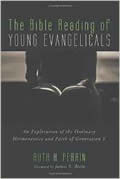
One of my hopes for this site has been that it would provide an opportunity for people doing high quality research into Christian faith to get their findings out. So, I’m delighted that Chris Frost – a church leader in Leeds – has taken the time to share his MA findings. They make for interesting reading and provide food for thought in terms of ministry to young adults – see what you think!
Chris writes:
It should be of no surprise that ‘Intellectual credibility’ is one of Ruth’s four suggested ‘on-ramps’ for how younger generations come to faith. Other recent findings agree, and the use of apologetics has a Biblical prescription (1Peter 3:15), alongside a rich Christian tradition.[1] But what are the intellectual doubts that the younger generation hold? What are they asking?
There are numerous Christian apologetics books, including some targeted at the younger market.[2] They claim to handle the most common objections to the Christian faith.[3] However, none of them provide any empirical evidence for the objections they consider to be the most frequent.
If you had to have one objection to the Christian faith, what would it be?
As a church leader with many young people in attendance and a speaker at apologetic events on university campuses, I wanted to find out what the main intellectual barriers to faith really are, rather than what we guess they are. So, in September 2018 our team asked over 200 university students: ‘If you had to have one objection to the Christian faith, what would it be?’
The results were shocking.
We expected something along the lines of ‘All the suffering in the world’. While conceding how free of physical suffering younger generations are, comparative to history, there is a paradox at play: Andrew Wilson writes, “My generation struggles with the problem of suffering more, not less, than most of those who have gone before us” as, “The less we have suffered, the less equipped we are to deal with it.”[4] But suffering was not the top objection.
If not suffering, perhaps ‘Just one religion can’t be true’? Recognising a new culturally pervasive form of tolerance, which according to Don Carson, “Is the social commitment to treat all ideas and people as equally right, save for those who disagree with this view of tolerance”.[5] The ultimate truth claims of Christianity were predicted to be highly objectionable, but exclusivity was not the top objection, even among the generation that had been brought up in this new tolerance.
If not exclusivity, perhaps, ‘Christians have put me off’? In 2013, controversial U.S. Pastor, Mark Driscoll undertook a study into the most common objections to the Christian faith; ‘The Resurgence Report’ (2013). The data was collated using a telephone survey of over 1,000 responses throughout the U.S. and found that the primary objection to Christianity (21% of the sample) was: “The Christian religion and I have different views on social issues like abortion or gay marriage”. Parallels between the U.S. and UK contexts are easy to make, however, Driscoll’s work could also be distinctive to its context. For example, the UK Talking Jesus (2015) research, found the top 3 words British non-Christians used to describe a Christian they knew were: ‘Friendly, caring and good humoured’. This is significant given that ‘two-thirds (67%) of non-Christian adults in England say they know a practising Christian’. It was comfortably confirming then, to find that ‘Christians have put me off’, was not the top objection either.
So what did we find?
The primary objection to the Christian faith was “There’s not enough proof”
In fact, according to our findings, none of the above objections came close to number one. The primary objection to the Christian faith was (drum roll please): “There’s not enough proof”, which received 21.5% of the responses, around double all of the next three highest objections; ‘All the suffering in the world’ at 11.2%, ‘Christians have put me off’ at 10.7% and ‘Just one religion can’t be true’ at 9.8%.
This stand-out result was surprising because it suggests a need for analytical evidence for faith among the younger generation, which flies in the face of calls for a different approach. For example, McLaren and Campolo argue that in the field of apologetics, leaders should transition from ‘Apologist’ to ‘Apologiser’: “Instead of defending old answers, the new kind of leader will often apologise for how inadequate they are… sincere apology is the new apologetic.”[6]
40% of people do not realise Jesus was a real person who actually lived
Perhaps we should start engaging again in traditional forms of evidential apologetics among the younger generation, especially when we consider “40% of people do not realise Jesus was a real person who actually lived and that one in four 18 to 34-year-olds thinks Jesus was a mythical or fictional character”.[7]
Ruth Comments:
This seems to me to raise some interesting questions about what we teach in Churches, how we engage in evangelism and how we encourage and equip young adults to share their faith. My suggestion is that we all start by asking those we all minister to about this and hear their experiences and ideas. However, this is something we CAN be confident about, no serious historian thinks Jesus didn’t exist!
Chris has generously offered his wider research for consideration so if you are interested do use www.oneobjection.com to find out the most common objections in your area.
Equally, if you have Postgraduate or higher level research you’d like to share drop me a line below and we can begin a conversation.
Footnotes
[1] https://www.fusionmovement.org/blog/1358
[2] Such as Group Publishing’s; The Top 13 Questions about God: Intense Discussions for Youth Ministry (2002).
[3] Such as McFarland’s: The 10 Most Common Objections to Christianity (2007).
[4] Wilson, A. (2015, 23). The Life You Never Expected, Inter Varsity Press.
[5] Carson, D. (2012, 31). The Intolerance of Tolerance, WM. B. Eerdmans Publishing Co.
[6] McLaren and Compolo, (2003:147) Adventures in Missing the Point, Navpress Publishing Group.
[7] Talking Jesus survey. (2015) Available: https://talkingjesus.org/wp-content/uploads/2018/04/Talking-Jesus.pdf



We'd love to hear your thoughts and experiences. How have you tried to address this in your faith community?